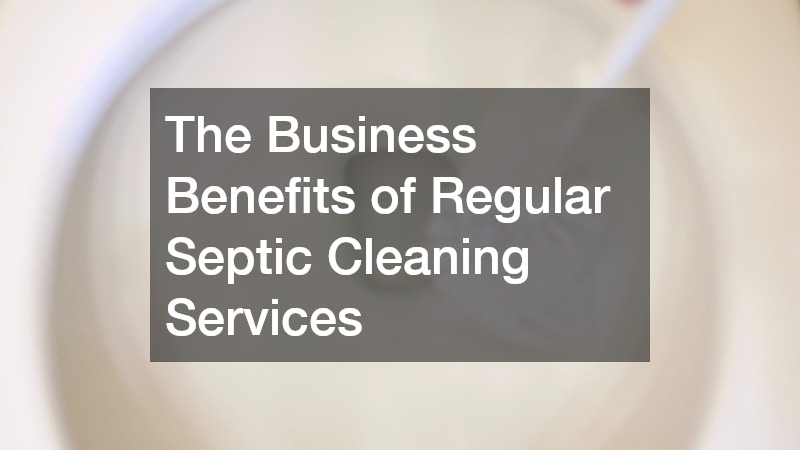Running a successful business requires more than strong leadership, dedicated staff and reliable customers. Behind the scenes, essential infrastructure keeps operations running smoothly. For businesses that rely on septic systems, regular maintenance is a critical part of that infrastructure. While septic systems often go unnoticed until a problem arises, consistent servicing can prevent costly disruptions, safeguard health and safety and protect the environment. Investing in regular septic cleaning services is not just a maintenance task—it is a strategic business decision that delivers measurable benefits.
Safeguard daily operations
Unplanned downtime can be one of the most expensive challenges a business faces. A malfunctioning septic system can quickly cause blockages, foul odours or even overflows, forcing staff and customers away from the premises.
Restaurants, hospitality venues, childcare centres and offices all rely on hygienic, functioning facilities to remain operational.
By scheduling septic sterilisation at regular intervals, businesses reduce the risk of sudden failures. This proactive approach ensures that tanks are emptied before reaching capacity, allowing wastewater to flow freely and keeping plumbing systems in good order. The outcome is uninterrupted daily operations and peace of mind for both management and staff.
Reduce long-term costs
Business budgets are often stretched across competing priorities, and it may be tempting to delay routine maintenance to cut short-term expenses. However, neglecting septic sanitation can result in far higher costs over time. Accumulated solids and untreated waste can cause damage to pipes, pumps and drainage fields. Repairing or replacing these components is significantly more expensive than routine servicing.
A predictable cleaning schedule helps extend the life of the system and reduces the risk of major repairs. It also allows businesses to plan expenses more effectively, allocating funds for routine maintenance rather than scrambling to cover the financial shock of emergency call-outs. Over time, this reduces total operating costs and creates a more stable financial outlook.
Maintain compliance with health regulations
Workplace health and safety regulations in Australia require businesses to provide clean, functional and sanitary facilities. Failing to keep septic systems in good condition can expose staff and customers to harmful bacteria, contaminated groundwater and unsanitary conditions. For businesses in industries such as hospitality, healthcare and childcare, this can quickly lead to breaches of compliance requirements and reputational damage.
Engaging professionals for regular septic sterilisation ensures that tanks are serviced to industry standards. This not only helps prevent contamination but also demonstrates a commitment to the well-being of staff and customers.
Protect brand reputation
Customers often associate the quality of facilities with the professionalism of a business. Unpleasant odours, blocked toilets or visible system failures can leave a lasting negative impression. Even if the products or services offered are of high quality, poor sanitation can drive customers away.
A well-maintained septic system helps create a welcoming environment that reflects positively on the brand. Whether it is a café aiming to retain loyal diners or a professional office catering to clients, ensuring that facilities remain clean and functional demonstrates attention to detail and customer care. Investing in septic cleaning services protects not just the physical environment but also the reputation that underpins long-term success.
Support environmental responsibility
Sustainability is an increasing focus for modern businesses, with customers and communities placing value on environmentally responsible practices. Septic systems that are not regularly serviced can leak untreated wastewater into the ground, leading to soil and water pollution. This has serious consequences for local ecosystems and can undermine the environmental image of a business.
By committing to scheduled septic sterilisation, businesses minimise the risk of contamination and contribute to a cleaner, safer environment. This responsibility extends beyond compliance—it supports community expectations of sustainable practices and strengthens a business’s position as a responsible corporate citizen.
Gain expert insight through servicing
Another advantage of professional servicing is access to industry expertise. Septic system technicians are trained to identify early signs of wear, potential blockages or design issues that could cause future complications. Regular inspections provide valuable insights, allowing businesses to make informed decisions about upgrades, usage habits and long-term planning.
For many businesses, septic systems operate quietly in the background, rarely considered until a problem arises. However, neglecting maintenance can lead to costly disruptions, regulatory challenges and reputational harm. By investing in regular septic sanitation services, businesses can safeguard operations, reduce long-term expenses, comply with health standards, protect brand reputation, demonstrate environmental responsibility and access expert advice.
What may seem like a routine maintenance task is, in fact, a strategic decision that delivers lasting business benefits. A commitment to scheduled servicing keeps operations running smoothly, protects financial stability and builds trust with both staff and customers. Ultimately, businesses that prioritise septic cleaning gain more than a well-functioning system—they secure a stronger foundation for growth and success.





